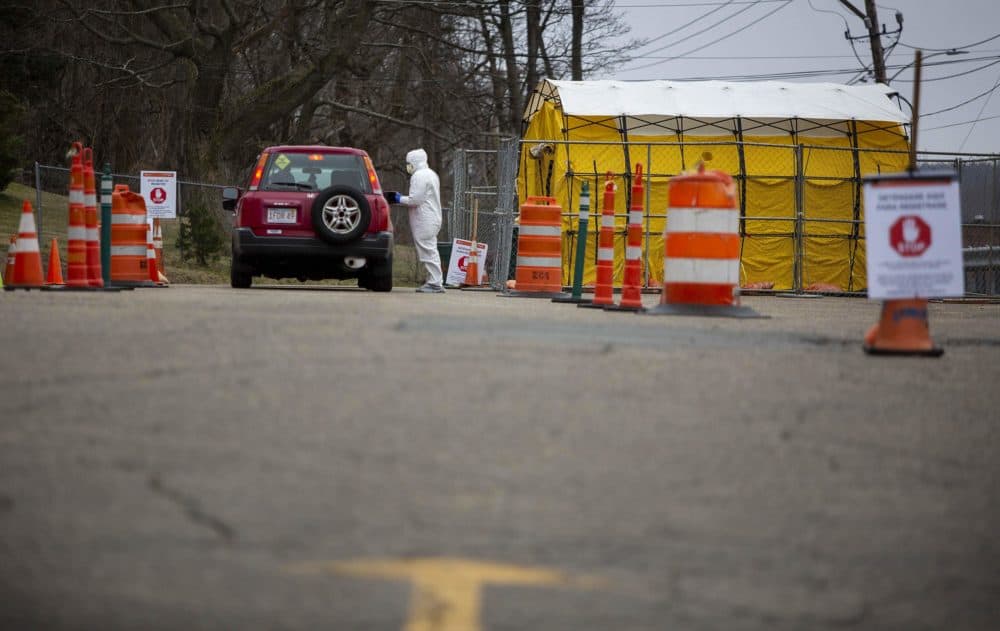Advertisement
Coronavirus Coverage
Preparing For COVID-19 'Surge,' Mass. Hospitals Are Losing $1 Billion A Month, Says Hospital Association
Resume
Hospitals have been preparing for a surge in illnesses and deaths from COVID-19.
In Massachusetts, state leaders now say the surge is expected to hit between April 10 and April 20.
Friday, hospitals started to receive much-needed supplies of N95 protective masks the state purchased from China and flew in Thursday with the help of the owners of the Patriots and their team jet.
For more on what else hospitals are doing to fortify themselves, WBUR's All Things Considered host Lisa Mullins spoke with Steve Walsh, president and chief executive officer of the Massachusetts Health and Hospital Association. Walsh said it's impossible for hospitals to over-prepare for the expected spike in cases, and the preparation is taking a great financial toll.
Interview Transcript
We're preparing every day, and we'll never quite know if we did enough until it happens. But this is one of those things where you go back to the old "Field of Dreams" movie. If you build it, they will come. Well, we're hoping if we build it, they won't come.
And so at this point, a lot of hospitals are trying to play it safe and canceling elective surgeries, etc. We know that some hospitals have a lot of capacity right now — a lot of beds available. Does the same hold true for most hospitals?
By and large, we're seeing a reduction in census and hospitals doing a great job of discharging patients to have as many accessible beds for the coming crisis.
But here is what we were looking at. And I know there are many models, and I'm not sure what you look at. But the University of Washington looked at capacity and equipment around the country and said Massachusetts will need about [9500] hospital beds when the peak hits in mid-April, but only half that many beds will be available. And it said [the state will] need about 1400 intensive care beds, but only a few hundred will be available. Again, that's just one projection. But how concerned are you about those numbers?
Well, we've looked at every projection to see what we think and whether or not it's tracking with the modeling that our hospitals have done ... and working with the Baker administration and the COVID command center, they're looking at field hospitals ... they're looking at other facilities where we might be able to house lower-acuity patients, and looking at partnering with nursing homes and long-term care facilities to make sure that we're utilizing every bit of capacity that we have in the Commonwealth to meet the numbers that you outlined.
There are hospitals right now, though, that have people in beds — taking up beds because they're sick, but it's not known if they actually have COVID-19. What is the holdup? Why are they still in these hospitals? Is it that [the hospitals] don't have enough tests available, or that they get tested and the results take so long to come back?
It was frustrating initially that some of the tests were taking a while, but now we're to the place where there is a much quicker turnaround ... Most folks now that are showing symptoms are getting tested.
Where do hospitals stand in terms of the proper amount of ventilators? The state is supposed to get 1,000 more from the federal government. How many are there here right now, and how great is the need for more?
We continue to try to source ventilators. Again, it depends on some of those surge numbers as to what might be needed for ventilators, but obviously that thousand coming is a critical need for the Commonwealth, and we'll continue to try to to purchase more.
I want to ask you about finances and hospitals. Hospitals are under great financial strain right now. We know that. Several weeks ago they started canceling elective procedures to try to free up space. That means less revenue. What kind of a toll has that taken?
Well, it's enormous. So the elective procedures, that revenue is about a billion dollars a month to our hospital system.
A billion dollars a month. How is that felt?
Well, you're seeing it. I mean, hospitals are really struggling. And this is not a time that we can have hospitals in any kind of financial distress. So the administration has been partnering — the federal government has offered an enormous package, as you saw, and we'll try to identify where the resources are most needed so hospitals can stay open during this pandemic.
And that rescue package from the federal government, how far will that go?
It depends. I mean, it remains to be seen how much of that Massachusetts will receive. It could be an enormous lift. What we know is that hospitals are doing everything they can to survive and keep caregivers on the front lines to serve the patients when they arrive. Like every other industry, they've had to make some hard decisions. But this is not a time that we can have any of our hospitals go under financially.
This segment aired on April 3, 2020.

